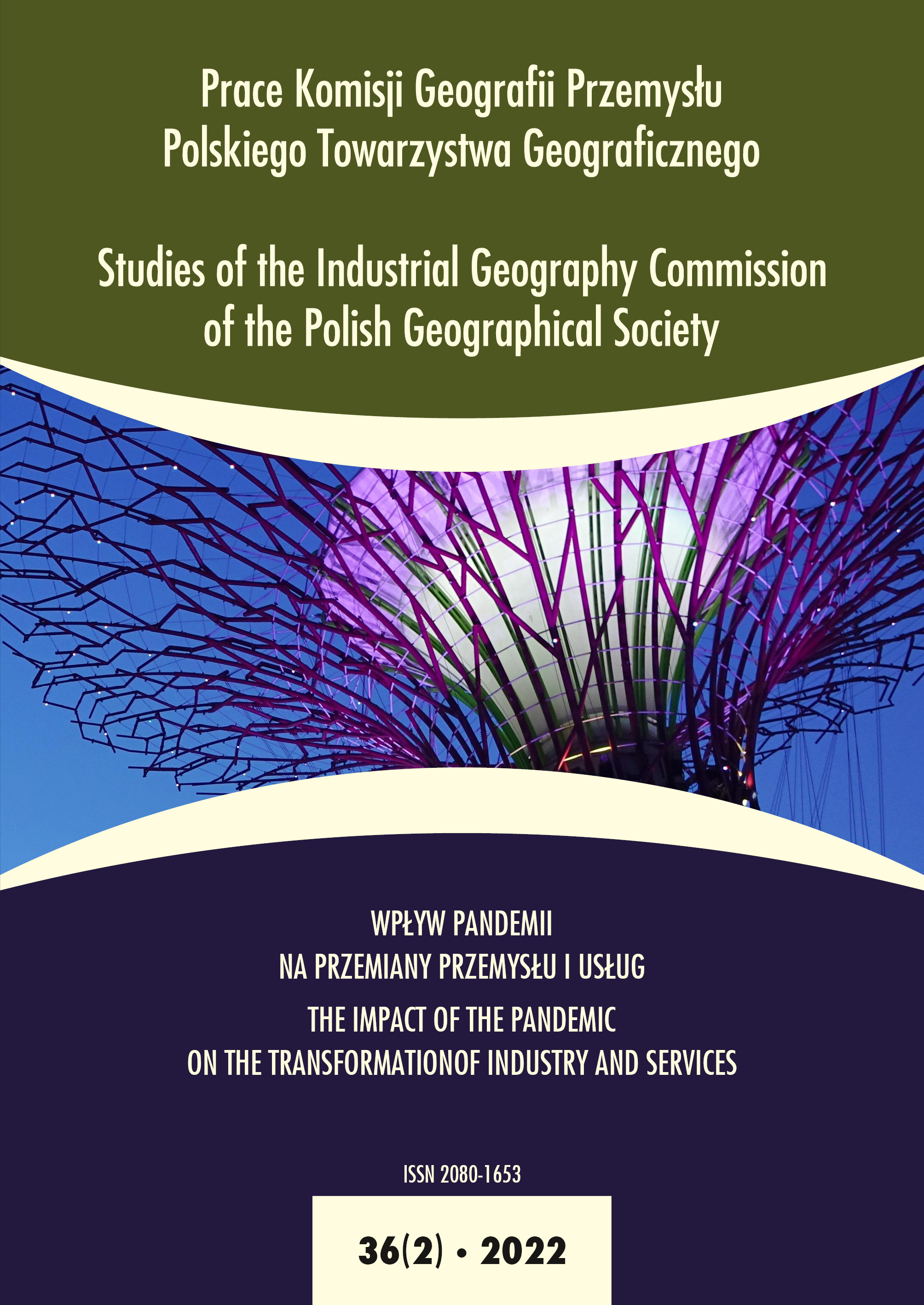Wpływ pandemii COVID-19 na zmiany w sektorze usług w Polsce
DOI:
https://doi.org/10.24917/20801653.362.8Słowa kluczowe:
pandemia, sektor usług, PolskaAbstrakt
Ogłoszony w 2020 r. przez Światową Organizację Zdrowia stan pandemii globalnej COVID-19 spowodował bezprecedensowe ograniczenia w funkcjonowaniu społeczeństw i gospodarki. Wpłynęły one w różnym stopniu i zakresie na sektor usług. Celem artykułu jest omówienie zmian, które zaszły w sektorze usług w okresie pandemii COVID-19, w szczególności zmian dynamiki powstawania nowych przedsiębiorstw usługowych, wpływu pandemii na kondycję ekonomiczną przedsiębiorstw, a także ich wrażliwości na tak silny bodziec zewnętrzny. Ponadto w pracy dokonano analizy zmian zachodzących w różnych rodzajach działalności usługowej (w układzie Polskiej Klasyfikacji Działalności) - wykorzystano w tym celu dane publikowane przez Główny Urząd Statystyczny oraz Eurostat.
Downloads
Metrics
Bibliografia
Benanav, A. (2021). Service work in the pandemic economy. Service Work in the Pandemic Economy. International Labor and Working‑Class History, 99, 66–74.
Burkle, F.M. Jr. (2006). Globalization and disasters: Issues of public health, state capacity and political action. Journal of International Affairs, 59(2), 231–265.
Caroll, N., Conboy, K. (2020). Normalising the “New normal”: Changing tech‑driven work practices under pandemic time pressure. International Journal of Information Management (2020), 102–186.
Chang, S.E. (2010). Urban disaster recovery: a measurement framework and its application to the 1995 Kobe earthquake. Disasters, 34, 303–327.
Dutkowski, M. (2018). Fragile, Robust and Antifragile Services. European Journal of Service Management, 4, 28(2).
Gossling, S., Scott, D., Hall, C.M. (2020). Pandemics, tourism and global change: A rapid assessment of COVID-19. Journal of Sustainable Tourism, 1–20.
Gray, R.S. (2020). Agriculture, transportation, and the COVID-19 crisis. Canadian Journal of Agricultural Economics, 68, 239–243.
Gunay, S., Kurtulmus, B.E. (2021). COVID-19 social distancing and the US service sector: What do we learn?, Research in International Business and Finance, 56.
Javed, A. (2020). Impact of COVID-19 on Pakistan’s services sector. Jurnal Inovasi Ekonomi, 5/3, 107–116.
Keesara, S., Jonas, A., Schulman, K. (2020). Covid-19 and Health Care’s Digital Revolution. The New England Journal of Medicine, 382.
Lu, L., Peng, J., Wu, J., Lu, Y. (2021). Perceived impact of the Covid-19 crisis on SMEs in different industry sectors: Evidence from Sichuan, China. International Journal of Disaster Risk Reduction, 55(24), 1–9.
Lee, C.K., Song, H.J., Bendle, L.J., Kim, M.J., Han, H.S. (2012). The impact of non‑pharmaceutical interventions for 2009 H1N1 influenza on travel intentions: a model of goal‑directed behavior. Tourism Management, 33(1), 89–99.
Liu, Ch., Black, W.C., Lawrence, F.C., Garrison, M.E.B. (2012). “PostDisaster Coping and Recovery: The Role of Perceived Changes in the Retail Facilities”. Journal of Business Research, 65(5), 641–647.
Loayza, N., Eduardo, O., Rigolini, J., Christiaensen, L. (2012). Natural Disasters And Growth Going Beyond The Averages. World Development, Elsevier, 40(7), 1317–1336.
McKibbin, W., Fernando, R. (2020). The Global Macroeconomic Impacts of COVID19: Seven Scenarios. CEPAR: Australian National University.
Maital, S., Barzani, E. (2020). The Global Economic Impact of COVID-19: A Summary of Research. Samuel Neaman Institute for National Policy Research.
Page, S.J., Yeoman, I., Munro, C., Connell, J., Walker, L. (2006). A case study of best practice VisitScotland’s prepared response to an influenza pandemic. Tourism Management, 27(3), 361–393
Pearson, M.M., Hickman, T.M., Lawrence, K.E. (2011). Retail recovery from natural disasters: new Orleans versus eight other United States disaster sites. The International Review of Retail Distribution and Consumer Research, 21(5), 415–444.
Shingal, A. (2020). Services trade and COVID-19, VoxEU online article, CEPR Policy Portal, Available, on May 7th, 2020. Pozyskno z: https://voxeu.org/article/services‑trade‑and‑COVID-19
Taleb, N.N. (2013). Antykruchość. O rzeczach, którym służą wstrząsy. Warszawa: Kurhaus.
Vitálišová, K., Vaňová, A., Borseková, K., Helie, T. (2021). Impacts of the COVID-19 pandemic on the policy of cultural and creative industries of Slovakia. Scientific Papers of the University of Pardubice, Series D: Faculty of Economics and Administration, 29(1), 1241.
Wilder‑Smith, A. (2006). The severe acute respiratory syndrome: impact on travel and tourism. Travel Medicine and Infectious Diseases, 4, 53–60.
Xiang, S., Rasool, S., Hang, Y., Javid, K., Javed, T., Artene, A.E. (2021). The Effect of COVID-19 Pandemic on Service Sector Sustainability and Growth. Frontiers in Psychology, 12.
Pobrania
Opublikowane
Jak cytować
Numer
Dział
Licencja
Prawa autorskie (c) 2022 Prace Komisji Geografii Przemysłu Polskiego Towarzystwa Geograficznego

Utwór dostępny jest na licencji Creative Commons Uznanie autorstwa – Bez utworów zależnych 4.0 Międzynarodowe.
Artykuły publikowane są zgodnie z warunkami licencji Creative Commons (CC BY-ND 4.0; uznanie autorstwa-bez utworów zależnych).

